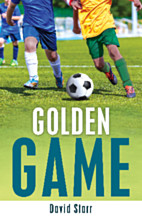| ________________
CM . . . . Volume XXIV Number 20. . . . January 26, 2018
excerpt:
In the companion novel to Tournament Fugee, Victor Bayazid's friend, Abbas Wassef, takes the central roll. Much like in Victor's story, Abbas deals with the stress and trauma surrounding his immigration to Canada from war torn Syria. Abbas' story begins with his witnessing a car accident that triggers a flashback of planes bombing a city that he and his mother were in. After this experience, Abbas begins to have nightmares and becomes rather listless, even finding that soccer, one of his favourite activities, “didn't mean so much to him” (p. 14). Shortly after this happening, Abbas and his soccer team are invited to visit the Electronic Arts game studio in Vancouver. When they go, the boys are told that they have the opportunity to play at the Top Flight soccer tournament in Toronto. While everyone is excited and ready to go, Abbas knows he cannot because of his fear of planes. This situation causes him to become angry and irritable towards his friends, with Abbas even going so far as to push one of them on the soccer pitch. Abbas does not understand why he is acting this way, and his confusion and fear surrounding his reactions are palpable to readers. He fears that he is crazy, and only when his principal, Ms Bhullar, explains to him that he's experiencing post traumatic stress disorder does Abbas begin to understand what he's going through. Abbas' reactions to, and confusion about, his trauma are extremely realistic and well-written. Being a 12-year-old boy, he wouldn't understand what was happening, and his acting out in light of everything is incredibly accurate. After his meeting with Ms Bhullar, Abbas is encouraged to tell his teammates the reason for his behaviour; he is reluctant at first, finding it embarrassing, but he does tell his team. Abbas explains his fear of flying, and his friends tell him that they understand and will support him in getting to the Top Flight tournament. They then all share something they're afraid of to show Abbas that he's not alone. This is one of the moments that makes this book as outstanding as it is. The way Abbas' team is constantly there for him and how they show unrelenting support in the face of his fears and trauma is incredible. This sets a perfect example of how to handle these sorts of situations, and it normalizes the support that people suffering from PTSD need. After learning about her son’s condition, Abbas' mother, Amira, sends him to see a therapist, Haval Ahmed. Abbas is, once again, wary at first, but, during his meeting with Haval, they bond over soccer, and Haval eases Abbas' fears about therapy. He gives Abbas some breathing exercises to try at home, and Abbas finds that they help with his nightmares. Throughout his five therapy sessions, Abbas improves with his anxiety, and he opens up to Haval about his traumatic experiences during his immigration. The therapy in Golden Game is encouraged and normalized, but it also shows real reactions and reluctance to the idea of it. However, while there is reluctance to therapy, it is shown to be truly beneficial to Abbas in the story. This part of the novel also expands on Abbas' support system, featuring the adults in his life. His mother, Ms Bhullar and Haval are all willing and wanting to help Abbas work through his anxiety and get him to the Top Flight tournament. They get him the help he needs and do their best to normalize and put his anxieties into perspective, knowing that Abbas is very concerned with appearing crazy. Abbas's soccer coach also helps Abbas through his anxieties when they are heading to the airport by distracting him with talk of soccer. The adults in Abbas' life are all very accepting and supportive of him and his needs, and this support makes all the difference for him in his recovery. While Abbas is dealing with his fear of flying and his trauma around his immigration, he is also training for the tournament. He and his team, the Grandview Eagles, work hard to be the best at the Top Flight tournament, competing against another local team and honing their skills. They all work to improve and help each other in order to win the tournament. With all of his hard work and the support from his friends and family, Abbas is able to board the plane to Toronto. Once there, the Eagles settle into their temporary homes, and Abbas meets with his old friend Victor. Victor and Abbas talk about their struggles as refugees and reminisce about Syria. Abbas thinks about how easy it is to talk to Victor about everything because they not only have similar experiences, but they come from the same place. The Eagles play through the tournament and advance to the final round where they face Victor's team. Although the book ends before Top Flight does, the conclusion is thoroughly satisfying with both Victor's and Abbas' teams knowing they did their best, and Abbas feeling no fear. In Golden Game, David Starr has written a truly amazing representation of PTSD and anxiety in Abbas. He created a wonderful support system that was crucial to Abbas being able to grow as he did in the book. Without his teammates, family, friends, and teachers, Abbas wouldn't have been able to progress the way he did, and through this representation support systems like this are normalized. Highly Recommended Deanna Feuer is an English Literature graduate from the University of the Fraser Valley. She lives in Langley, BC.
Next Review |
Table of Contents for This Issue
- January 26, 2018. |
